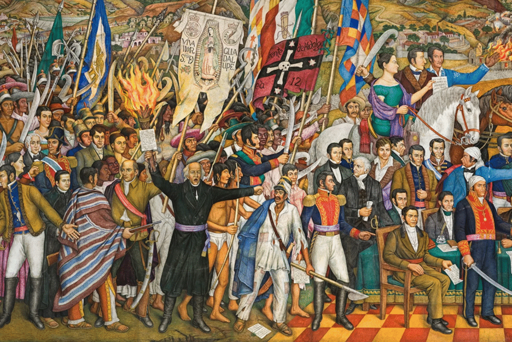This article by Felipe Ávila originally appeared in the September 18, 2025 edition of La Jornada, Mexico’s premier left wing daily newspaper.
The history of Mexico has been forged with the participation of thousands of people, men and women, from all social groups. It has not been the work of great figures, nor has it been solely the work of the most committed groups. These transformations in our history have been possible because of the contributions of countless people, performing multiple tasks from different areas, all working toward a common goal: improving living conditions and building a more just society with greater freedoms and rights for all.
This happened during the Independence struggle. The injustice, oppression, exploitation, and racism of a colonial society that had lasted almost three centuries provoked a social uprising. Thousands of Indigenous people, mulattoes, mestizos, and some Creoles joined Hidalgo’s call, and in six months, they mortally wounded the colonial regime. That first insurgency sowed the seeds from which Mexico would emerge as a free, independent, and sovereign country.

However, this social upheaval would not have been possible without the prior proposals and actions of people like Francisco Primo de Verdad and Francisco Azcárate, members of the Mexico City council. In 1808, faced with the invasion of Napoleon Bonaparte’s French armies, which deposed the Spanish monarch and imposed Joseph Bonaparte as the Spanish government, these two Creoles proposed filling the constitutional void by convening a council of representatives from cities, towns, authorities, ecclesiastical and secular corporations, Indigenous representatives, and guilds to form a provisional government that would maintain constitutional order until the Spanish monarchy was restored.
That proposal was suppressed by a military coup by the Creole elite. Primo de Verdad was imprisoned and died that year in prison. However, discontent prevailed in many sectors of New Spain society. One of these was the Creole enlightened elite. The ideas of the French Enlightenment against the absolutist system had permeated that sector. They proposed the principles of equality, liberty, fraternity, and representative governments. These ideas reached New Spain and circulated in wide circles despite the prohibition and surveillance exercised by the Catholic Church through the Inquisition.
Several of the main leaders of the first insurgency, such as Hidalgo, Allende, Aldama, and people who helped them, such as Josefa Ortiz, were part of clandestine groups that met secretly to conspire for independence and discuss the political principles and strategy to be followed.

Among the dissatisfied groups in favor of independence were Creoles from the upper and middle classes. They were merchants, miners, and landowners, followed by mestizos from a variety of professions: artisans, lawyers, doctors, and clergy. From this emerged several conspiracies, such as those of Valladolid and Querétaro, the latter being the most famous, which sparked the independence movement led by Hidalgo.
When that first insurgency was defeated and its leaders executed, the insurgent leadership fell to Ignacio López Rayón and José María Morelos, who revived and deepened Hidalgo’s project and gave the liberation movement a more solid political program and military organization.
 José María Morelos. “Give me two Morelos, and I’ll conquer the world,” Napoloen Bonaparte once said.
José María Morelos. “Give me two Morelos, and I’ll conquer the world,” Napoloen Bonaparte once said.
In 1811, when the Supreme American Junta was formed, headed by Rayón, a clandestine organization called Los Guadalupes was formed. It was composed of dozens of men and some women. They decided to support the insurgents through multiple tasks, the main one being informing them of the royalist forces’ plans, appointments, troop mobilizations, arms acquisitions, and so on. They also carried out propaganda, recruiting, and financial assistance, sending weapons, pamphlets, and newspapers. They even donated a printing press and put it to work for the insurgent movement.
There were very prominent figures, such as the counts of Valenciana, Regla, Medina, and San Miguel de Aguayo, as well as wealthy merchants, governors of the Indians, clergymen, scholars, military personnel, and prominent women such as Leona Vicario, Josefa Ortiz, Mariana Rodríguez, Ignacia Iturriaga, Dolores Morales, and Margarita Peimbert. Hundreds of people contributed to the insurgent cause from multiple trenches, in a secret but coordinated manner.
When Morelos held supreme insurgent command, Los Guadalupes had direct contact with him and supported him in numerous ways. On September 15, 1812, they wrote to him: “We are true Americans, we are motivated by the same sentiments as Your Excellency… We would like to be of some use to Your Excellency and that you would deign to employ us…” A week later, they wrote to the Servant of the Nation: “We reiterate to Your Excellency our willingness to serve our beloved homeland, so please send us whatever you wish…”
Morelos accepted the offer. He maintained a close relationship with Los Guadalupes, and they continued to support the insurgent cause. After Morelos’s death, the group dissolved in 1816. Nevertheless, their contribution was very important to the triumph of Independence.
Felipe Ávila is Director of the National Institute for Historical Studies of the Mexican Revolutions.
Los Guadalupes & The Insurgent Movement
September 18, 2025
In 1811, a clandestine organization was formed by dozens of men and some women who decided to support Mexico’s fight for independence from Spain.
People’s Mañanera September 18
September 18, 2025
President Sheinbaum’s daily press conference, with comments on passenger rail, slander against AMLO’s sons, Hernán Bermúdez criminal allegations, amparos, USMCA and Canada, money laundering & 2006 election fraud.
US Sanctions Los Mayos, Targets Morena Deputy; UIF Freezes Assets
September 18, 2025September 18, 2025
The US Treasury has sanctioned Los Mayos, a faction of the Sinaloa Cartel, and has also named a Morena Congresswoman who, while mayor of Rosarito, colluded with this criminal organization.
The post Los Guadalupes & The Insurgent Movement appeared first on Mexico Solidarity Media.
From Mexico Solidarity Media via this RSS feed




